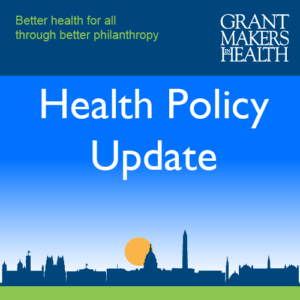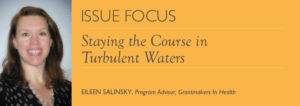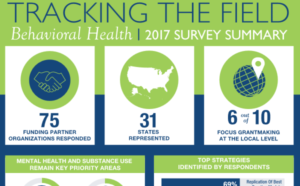Health Policy Update: May 8, 2025
In an effort to help our Funding Partners better understand the changing health policy landscape in the new administration and Congress, Grantmakers In Health (GIH) is expanding the GIH Health Policy Update newsletter to three issues per month. Working in collaboration with Leavitt Partners, a leading health care policy consultancy, we are adding new installments of the newsletter on the first and third Wednesdays of the month, while we will continue to partner with Trust for America’s Health on the installment released on the second Wednesday of the month.
Staying the Course in Turbulent Waters
Managing change is hard, but managing uncertainty can be even harder. This sentiment captures the challenges health funders have faced while navigating the roiling health policy debates of the 115th Congress.
Behavioral Health Funding Infographic and Directory
GIH’s latest survey report highlights current trends and gaps in behavioral health philanthropy. GIH surveyed Funding Partners in March 2017 about investments in mental health, substance use, trauma, and other behavioral health issues.
What Does “Population Health” Mean to You?
Population health is commonly defined as “the health outcomes of a group of individuals, including the distribution of such outcomes within the group” (Kindig and Stoddart 2003). This general definition is widely accepted and has been formally adopted by the National Academies’ Roundtable on Population Health Improvement.
Domestic Violence: A Public Health Priority
Domestic violence represents a significant public health problem that has received limited attention from the field of health philanthropy. Many health foundations fund domestic violence programs, but relatively few funders have identified domestic violence as a strategic priority.
“Amp’ing” Up Social Change
Grantmakers and the foundations they represent do not really listen, inspire or lead in any meaningful way. That is what I thought 15 years ago, as I worked in community organizing and advocacy.
Philanthropy’s Growing Toolbox
As health funders, we often sit in a unique position in our communities amidst a complex and ever-changing environment. We are not government—we are not restricted by the same rigid boundaries and funding parameters that our cities, states, and federal funders face.
Lead, Listen and Inspire: Measuring Health Improvement
Interact for Health in Cincinnati actively engages in data collection and applied research. We do this work because we are uniquely able to invest in high-quality data, ask politically controversial questions, and fund and partner with researchers with a similar research agenda.
Join & Become a GIH Funding Partner Today!
Click here to learn more about becoming a GIH Funding Partner and joining the largest national network of health funders.



